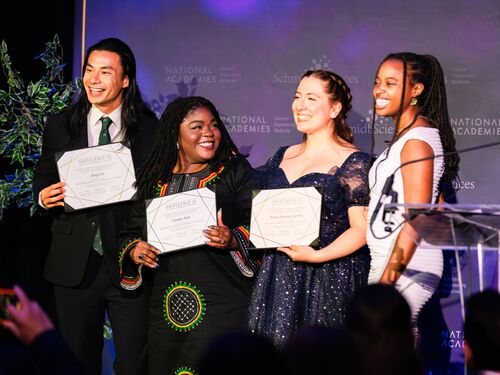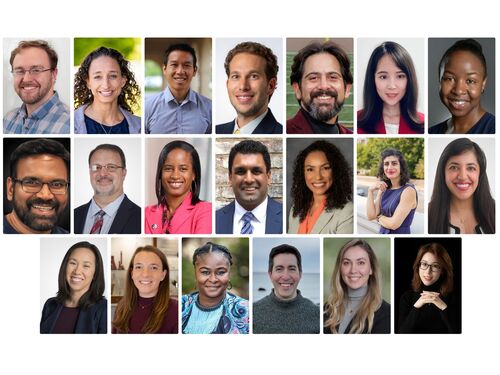GRP Awards Over $1 Million for Empowering K-8 Youth Through Place-Based Education Projects and Programs
News Release
By Pete Nelson
Last update September 1, 2022
WASHINGTON — The Gulf Research Program (GRP) of the National Academies of Sciences, Engineering, and Medicine today announced awards totaling $1,090,463 to support six projects that engage underserved children and youth in place-based educational activities. These projects will foster the development of scientific and environmental knowledge and skills that are critical to solving complex issues in the Gulf of Mexico region now and into the future.
Place-based learning is grounded in students’ local settings, including their physical environment, culture, and history. Targeted at engaging young learners across the Gulf region with local environmental issues, the awarded programs cover topics of pertinent environmental concern such as understanding the causes of and solutions to flooding, gathering environmental quality data in a local estuary, and conserving sea turtle populations.
In addition to developing place-based curricula, these programs support local teachers by providing them with paid professional development opportunities to incorporate place-based education into their schools and districts.
“The Gulf Research Program is excited to be awarding these grants focused on building the scientific capacity and environmental literacy of the next generation while supporting educators who play such a vital role in our communities,” said Karena Mary Mothershed, senior program manager for the GRP’s Board on Gulf Education and Engagement. “By grounding the curricula in place-based knowledge, this suite of projects empowers youth from the Gulf region to consider and address environmental challenges impacting their own lives.”
The awarded projects, in alphabetical order by project title, are:
Biodiversity, Relationships, and Aquatic Chemistry Knowledge in Saline Habitats (BRACKISH)
Project Director: Ayesha Gray, Grand Bay National Estuarine Research Reserve (NERR)
Location: Moss Point, Mississippi
Award: $285,998
Overview: This project will use place-based learning approaches, specifically hands-on and inquiry-based learning, to foster environmental literacy in eighth grade students in Pascagoula and Moss Point, Mississippi. The three-day program will immerse the students in reserve science and their local estuarine environment, ultimately increasing environmental literacy, problem-solving skills, and place-attachment. Day one will entail NERR staff presenting to students at their school as an orientation to the estuary, focusing on concepts and ecological principles. A second day, follow-up field experience at Grand Bay NERR will allow students to investigate the environment by collecting water quality data, species sampling, and exploring estuarine habitats. On the third day, concepts learned during the program will be reinforced by introducing students to mock case studies related to water quality issues within their community. Students will be assigned roles, challenged to develop potential solutions, and justify their reasoning with their peers.
Interdisciplinary Civic Science with Pre- and In-service Teachers to Connect Students to Place
Project Director: Lisa Gianukos, Children's Environmental Literacy Foundation
Location: Houston, Texas
Award: $103,555
Overview: The Children’s Environmental Literacy Foundation (CELF) and the UHCLTeach program at the University of Houston-Clear Lake will run this project jointly. CELF’s educator team will support four UHCLTeach cohorts reaching up to 100 pre-service educators with student project implementation support during their classroom placements, with additional support for up to 20 full-time teachers working in their placement schools. These placement schools will be located in Houston Independent School District, Goose Creek Consolidated Independent School District, and Pasadena Independent School District. These Gulf Coast districts serve students significantly impacted by environmental justice issues such as air pollution. CELF will apply its Civic Science: Inquiry to Action framework to guide teachers in implementing interdisciplinary, community-based student action projects that build students’ skills in systems thinking, data literacy, problem-solving, and place-based storytelling.
Puddles & Floods: Learning to “Read” Flood-Prone Landscapes of the Lower Mississippi River
Project Director: Claire Anderson, Ripple Effect Water Literacy Project
Location: New Orleans, Louisiana
Award: $223,810
Overview: This project proposes a two-part learning journey, in which upper elementary and middle school students build their understanding of scientific and social dimensions of flooding through investigations centered on two sites — their schoolyards and one off campus flood control location in Southeast Louisiana. Student learning experiences will traverse scientific, social, and political realms of flood control as they use field-based techniques and engage storytelling to build a science-based understanding of causes of flooding, and connect the phenomenon of increasing frequency of flood events to their own experiences and futures. Students will use research-based techniques to track how water moves through environmental and human systems within their schoolyard, and then apply these same investigations to track the movement of water in regionally significant sites of flood control. In a culminating project, students will share their own learning journey through creative writing, drawing, photographic essays, or other creative forms of expression to draw connections between their personal experiences with flooding, their developing socioecological knowledge, and field locations.
Sea Turtle Ambassadors for the Gulf: Increasing Scientific Literacy Through Field Experiences for Teachers/Students
Project Director: Rebecca Mott, Inwater Research Group
Location: Jensen Beach, Florida
Award: $144,500
Overview: The Sea Turtle Ambassadors for the Gulf (STAG) program will expand existing programming to underserved third through eighth grade students and teachers from Citrus, Hernando, and Pasco County school districts by providing immersive experiences that empower them to become sea turtle ambassadors within their communities. The program will give students and teachers a hands-on, inquiry-based learning opportunity using field experiences as they join Inwater’s research vessel in the coastal waters of the Gulf to capture, collect data from, and discuss threatened/endangered sea turtles. Teachers and students will also participate in training workshops and Inwater Research Group’s successful “Traveling Trunk” programs. These trunk programs build on existing sea turtle research and align with state standards to advance conservation efforts and enhance environmental literacy. Teachers will gain hands-on training on how to run these free programs with their students and be provided with opportunities to share what they’ve learned during the field component and their experience bringing the Gulf into the classroom.
Watershed Investigations: Place-Based Deep Dives for Title I Schools
Project Director: Kimberly Cooke, Pontchartrain Conservancy
Location: New Orleans, Louisiana
Award: $90,600
Overview: Watershed Investigations is a deep-dive program for educators and students in grades six-eight at Title I schools in the Pontchartrain Basin that seeks to advance science and understanding. Four teachers and 400+ students at four Title I schools will be engaged over the two-year period. Each semester, a new cohort, including the teacher and their students, will carry out a watershed investigation in their communities. Once a month for a semester, students conduct relevant tests at their chosen field site. These field visits provide the perfect opportunity for students to develop useful skills, such as data collection, collaborating, utilizing science equipment, and analyzing and interpreting data as they seek to answer their driving questions. At the end of the semester, students will present the data they collected, their analysis of the results, and their possible solutions in the format of their choice to the audience of their choice within their own communities.
Wide Horizons: Place-Based Education and the Future of the Gulf
Project Director: Julian Rankin, Walter Anderson Museum of Art
Location: Ocean Springs, Mississippi
Award: $242,000
Overview: The Walter Anderson Museum of Art’s Wide Horizons is an interdisciplinary place-based educational initiative for regional middle school students (grades six-eight) that will blend science, history, geography, and self-expression to target contemporary and future environmental challenges in the Gulf of Mexico. In partnership with the Pascagoula River Audubon Center and the University of Southern Mississippi’s Marine Education Center, the museum will lead two years of activities for participating students from across the Mississippi Gulf Coast. Activities include: daylong immersive field days to partnering sites and surrounding environments, accompanied by student journaling, art making, data-gathering, and peer-to-peer dialogue and problem-solving. Following these immersive field days, the museum will facilitate community-engaged climate action projects co-created between participating students and visiting artists that communicate data-driven and creative solutions to environmental issues of regional and local importance.
The National Academies’ Gulf Research Program is an independent, science-based program founded in 2013 as part of legal settlements with the companies involved in the 2010 Deepwater Horizon disaster. It seeks to enhance offshore energy system safety and protect human health and the environment by catalyzing advances in science, practice, and capacity to generate long-term benefits for the Gulf of Mexico region and the nation. The program has $500 million for use over 30 years to fund grants, fellowships, and other activities in the areas of research and development, education and training, and monitoring and synthesis.
The National Academies of Sciences, Engineering, and Medicine are private, nonprofit institutions that provide independent, objective analysis and advice to the nation to solve complex problems and inform public policy decisions related to science, technology, and medicine. They operate under an 1863 congressional charter to the National Academy of Sciences, signed by President Lincoln.
Contact:
Pete Nelson, Director of Communications
Gulf Research Program
PNelson@nas.edu
More like this
Discover
Events
Right Now & Next Up
Stay in the loop with can’t-miss sessions, live events, and activities happening over the next two days.
NAS Building Guided Tours Available!
Participate in a one-hour guided tour of the historic National Academy of Sciences building, highlighting its distinctive architecture, renowned artwork, and the intersection of art, science, and culture.



